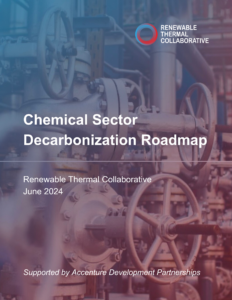 The Chemical Sector Assessment provides a comprehensive analysis of decarbonization opportunities within the U.S. chemical industry, which accounts for approximately 20% of the country’s overall industrial emissions. This report outlines effective strategies to reduce thermal emissions. If implemented, these approaches could deliver over 60% decarbonization of key production processes by 2050.
The Chemical Sector Assessment provides a comprehensive analysis of decarbonization opportunities within the U.S. chemical industry, which accounts for approximately 20% of the country’s overall industrial emissions. This report outlines effective strategies to reduce thermal emissions. If implemented, these approaches could deliver over 60% decarbonization of key production processes by 2050.
Developed through rigorous analysis and industry insights, this report offers:
- A detailed overview of the chemical sector’s emissions landscape focusing on three key high-temperature production processes for three basic chemicals: ammonia, high-value chemicals, and methanol.
- Evaluation of the technological readiness and emissions abatement potential of promising decarbonization solutions including electrification, clean hydrogen, waste-derived biomass, renewable natural gas (RNG), thermal storage, and carbon capture, utilization, and storage (CCUS).
- An explanation of a Systems Value Framework to help chemical companies consider the social and environmental impacts of thermal decarbonization, including for disadvantaged communities, and ensure broader community benefits.
- A roadmap with recommendations for chemical companies to achieve net-zero emissions.
This assessment aims to provide a crucial resource for chemical industry manufacturers, customers, policymakers, and any other stakeholders interested in the sustainable transformation of this vital sector.
Webinar Recording
The RTC hosted a webinar featuring a presentation from this report's authors at Accenture. Click the icon to watch the recording.

